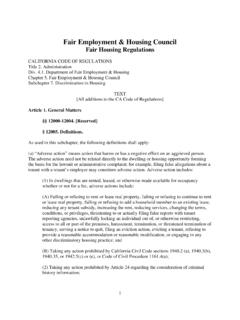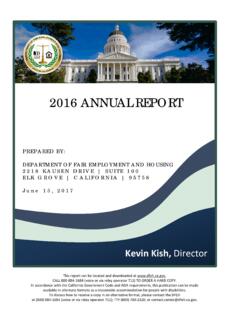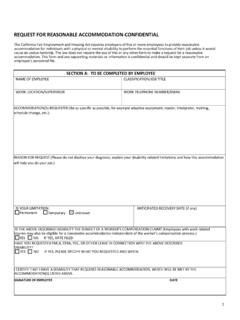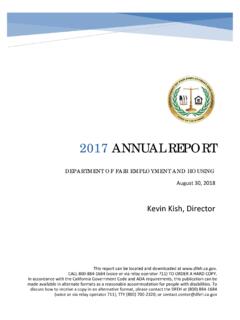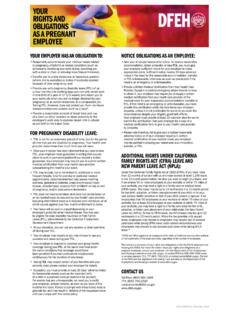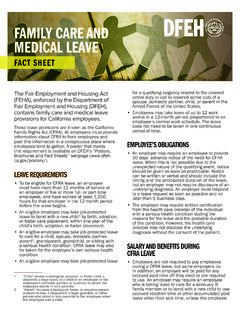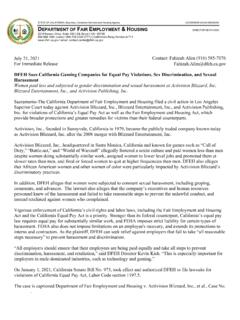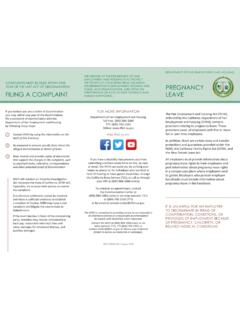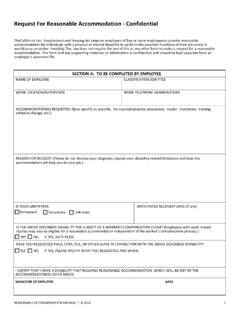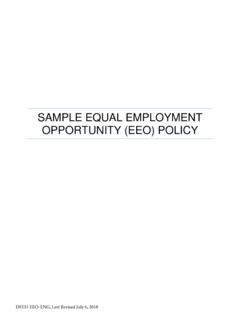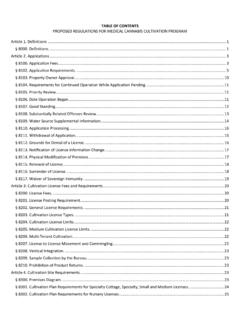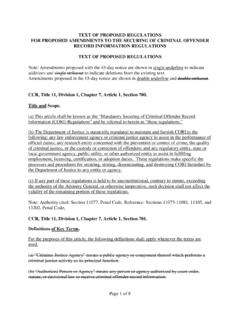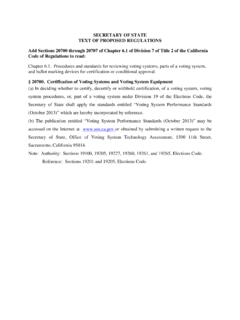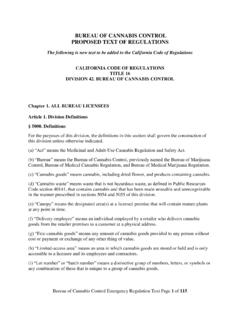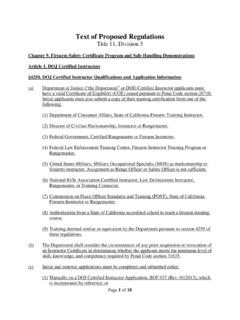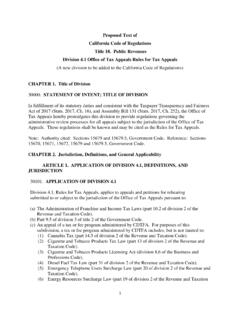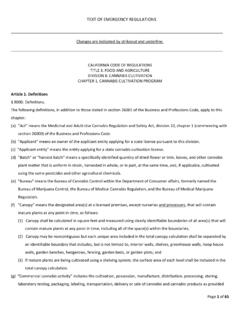Transcription of Additional Modifications to Text of Regulations …
1 1 Fair Employment & Housing Council Additional Modifications to Text of Regulations Regarding National Origin Discrimination CALIFORNIA CODE OF Regulations Title 2. Administration Div. Department of Fair Employment & Housing Chapter 5. Fair Employment & Housing Council Subchapter 2. Discrimination in Employment Article 4. National Origin TEXT Text proposed to be added for the 45-day comment period is displayed in underline type. Text proposed to be deleted for the 45-day comment period is displayed in strikethrough type. Text proposed to be added for the 15-day comment period is displayed in double underline type.
2 Text proposed to be deleted for the 15-day comment period is displayed in double strikethrough type. Text proposed to be added for the second 15-day comment period is displayed in bold type. Text proposed to be deleted for the second 15-day comment period is displayed in italics type. Nonsubstantial text proposed to be added after the second 15-day comment period is displayed LARGE STENCIL type. Nonsubstantial text proposed to be deleted after the second 15-day comment period is displayed in SMALL ALGERIAN type. Article 4. National Origin 11027. Defenses. These Regulations incorporate the defenses set forth in section 11010.
3 Note: Authority cited: Section 12935(a), Government Code. Reference: Section 12940, Government Code. Definitions. (a) National origin includes but is not limited to, the individual s or ancestors actual or perceived: (1) physical, cultural, or linguistic characteristics associated with a national origin group; (2) marriage to or association with persons of a national origin group; (3) tribal affiliation; 2 (4) membership in or association with an organization identified with or seeking to promote the interests of a national origin group; (5) attendance or participation in schools, churches, temples, mosques, or other religious institutions generally used by persons of a national origin group.
4 And (6) name that is associated with a national origin group. (b) National origin groups include, but are not limited to, ethnic groups, geographic places of origin, and countries that are not presently in existence. place of birth or geographic origin, national origin group or ethnicity; the physical, cultural, or linguistic characteristics of a national origin; an individual s marriage to, or association or perceived association with, a person of a national origin group; an individual s parental relationship with a person of a national origin group, including an adoptive, step, or foster care parental relationship; membership in or association with an organization identified with or seeking to promote the interests of a national origin group.
5 Attendance or participation in schools, churches, temples, or mosques, or other institutions generally associated with a national origin group; actual or perceived association of an individual s name with a national origin group; and language and/or accent. National origin also includes an individual s tribal affiliation. (c) Undocumented applicant or employee means an applicant or employee who lacks legal authorization under federal law TO BE PRESENT AND/OR to work in the United States. Note: Authority cited: Section 12935(a), Government Code. Reference: Section 12940, Government Code. 11028. Specific Employment Practices.
6 (a)-(c) (Reserved) (d) An employer may have a rule requiring that employees speak only in English at certain times, so long as the employer can show that the rule is justified by business necessity (See section 11010(b)) and the employer has effectively notified its employees of the circumstances and time when speaking only in English is required and of the consequences of violating the rule. (a) Language Restrictions. (1) It is an unlawful employment practice for an employer or other covered entity to adopt or enforce a policy that limits or prohibits the use of any language in the workplace, including, but not limited to, an English-only rule, unless: (A) The LANGUAGE RESTRICTIONPOLICY is job-related and consistent withjustified by business necessity; (B) The LANGUAGE RESTRICTIONPOLICY is narrowly tailored; and 3 (C) The employer has effectively notified its employees of the circumstances and time when the language restriction is required to be observed and of the consequence for violating the language restriction.
7 (2) For purposes of this subsection, business necessity means an overriding legitimate business purpose, such that: (A) The LANGUAGE RESTRICTIONPOLICY is necessary to the safe and efficient operation of the business; (B) The LANGUAGE RESTRICTIONPOLICY effectively fulfills the business purpose it is supposed to serve; and (C) There is no alternative practice to the language restriction that would accomplish the business purpose equally well with a lesser discriminatory impact. (3) It is not sufficient that the employer s LANGUAGE RESTRICTIONPOLICY merely promotes business convenience or is due to customer or co-worker preference.
8 (4) English-only rules are presumed to violate the Act on the basis of national origin and ancestry, unless the employer can prove the elements listed in 11028(a)(1)(A)-(C).business necessity. English-only rules are never lawful during an employee s non-work time, breaks, lunch, unpaid employer-sponsored events, etc. (b) Employment discrimination based on an applicant s or employee s accent is unlawful unless the employer proves that the individual s accent interferes materially with the applicant s or employee s ability to perform the job in question. (c) Discrimination based on an applicant s or employee s English proficiency is unlawful unless the English proficiency requirement at issue is justified by business necessity ( , the level of proficiency required by the employer is necessary to effectively fulfill the job duties of the position.)
9 In determining business necessity in this context, relevant factors include, but are not limited to, the type of proficiency required ( , spoken, written, aural, and/or reading comprehension), the degree of proficiency required, and the nature and job duties of the position. necessary for the effective performance of the specific position for which it is imposed, and a ( a lower the level of fluencytype and degree of proficiency required is tailored to the requirements of would materially interfere with the applicant s or employee s ability to perform the duties of the position in question). (d) It is not unlawful for an employer to request from an applicant or employee information regarding his or her ability to speak, read, write, or understand any language, including languages other than English, if justified by business necessity.
10 (d) Foreign training and experience. It is an unlawful employment practice, unless pursuant to a permissible defense, for an employer or other covered entity to deny employment opportunities to an individual because the individual received training or education outside the United States, or to require an individual to be foreign trained. 4 (e) Retaliation. It is an unlawful employment practice for an employer or other covered entity to retaliate against any individual because the individual has opposed discrimination or harassment on the basis of national origin, has participated in the filing of a complaint, or has testified, assisted, or participated in any other manner in a proceeding in which national origin discrimination or harassment has been alleged.
